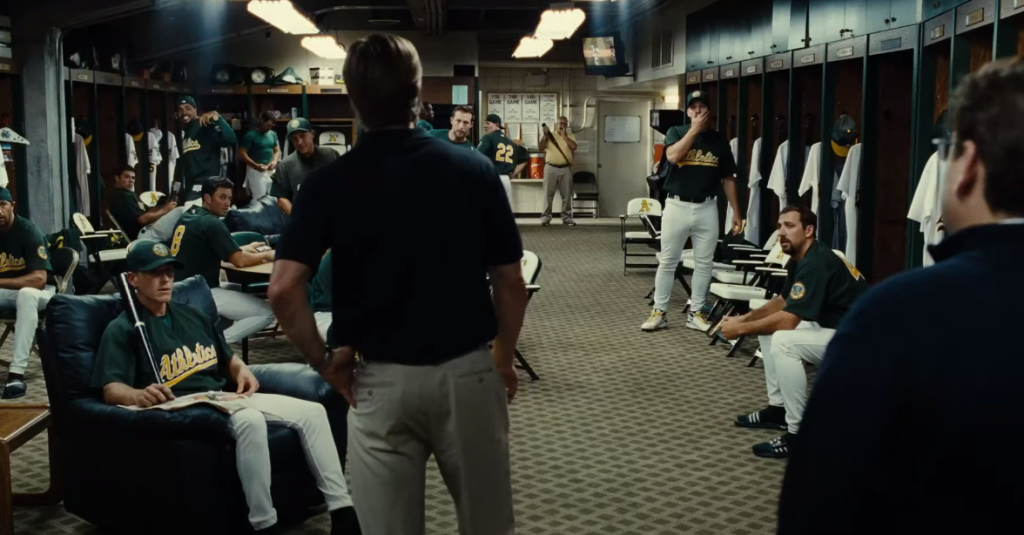

In the 2002 MLB season, the Oakland Athletics defied expectations by embarking on a historic 20-game winning streak despite being the lowest-salaried team in the league. This remarkable journey, immortalized in the film “Moneyball,” goes beyond a simple sports narrative to delve into the clash between traditional intuition and statistical analysis.
At the center of this story is Billy Beane, portrayed with depth by Brad Pitt, the dynamic general manager of the Athletics. Beane’s own experiences as a player, marked by unfulfilled potential, fuel his aversion to failure as he transitions to management. Despite previous successes, Beane faces the harsh reality of the team’s limited resources and the constant threat of losing star players to wealthier franchises.

Enter Peter Brand, portrayed by Jonah Hill, an economics graduate who introduces Beane to sabermetrics, a statistical methodology that challenges conventional scouting methods. Embracing Brand’s approach, Beane embarks on a bold experiment, assembling a roster of undervalued players identified through statistical analysis rather than traditional scouting.
The narrative unfolds as Beane and Brand navigate the competitive world of professional baseball, challenging entrenched beliefs and redefining the parameters of success. Together, they revolutionize the team-building process, assembling a roster of overlooked players who prove to be instrumental in the team’s unexpected success.

“Moneyball” transcends its sports-centric premise to explore universal themes of ambition, perseverance, and the relentless pursuit of excellence. Through rich characterizations and a thought-provoking narrative, the film resonates with audiences beyond the realm of baseball, highlighting the power of unconventional thinking in the face of adversity.
Peter Brand’s influence on Beane extends beyond persuasion; he fundamentally alters Beane’s approach to team building, advocating for statistical analysis over traditional scouting. Their collaboration challenges the status quo and reshapes the narrative of success in baseball.

Jonah Hill’s portrayal of Peter Brand is subtle yet compelling, showcasing the clash between conventional wisdom and innovative thinking. Brad Pitt’s depiction of Billy Beane adds complexity, portraying him as a determined yet vulnerable character driven by past failures. The dynamic between Beane and his team manager, Art Howe, played by Philip Seymour Hoffman, adds depth to the narrative, underscoring the resistance faced by innovators.
In essence, “Moneyball” is a story of resilience and innovation, illustrating the transformative power of unconventional thinking in the pursuit of excellence. Through its characters and narrative, the film offers a compelling exploration of the human spirit and the pursuit of greatness against all odds.

| Aspect | Description |
|---|---|
| Storyline | Focuses on the Oakland Athletics’ 2002 season, marked by a 20-game winning streak, led by GM Billy Beane’s adoption of sabermetrics. |
| Main Characters | Billy Beane (Brad Pitt), Peter Brand (Jonah Hill), Art Howe (Philip Seymour Hoffman) |
| Conflict | Traditional scouting vs. statistical analysis; Beane’s struggle with past failures and limited resources |
| Themes | Innovation, perseverance, quest for excellence, clash between convention and innovation |
| Impact of Peter Brand | Revolutionizes Beane’s approach to team building with statistical analysis, advocates for undervalued players |
| Brad Pitt’s portrayal | Depicts Beane as introspective, driven by past failures, dedicated to success despite personal struggles |
| Jonah Hill’s portrayal | Brand’s quiet confidence in statistical analysis challenges baseball traditions, serves as a commentary on the clash between old and new methods |
| Philip Seymour Hoffman’s portrayal | Howe’s skepticism towards Beane’s methods reflects resistance to change, adds depth to the narrative |
| Overall Impact | Transcends sports narrative, explores universal themes of innovation and resilience, offers a compelling portrayal of unconventional thinking and its impact in professional sports |






